Evaluating the 2023-2025 Hamas-Israel War and Its Consequences (video, 44:06)
CIE President Ken Stein briefly reviews the 2023-2025 Hamas-Israel war and examines the short- and long-term consequences.
These webinars and other videos drawn from in-person and online events run as little as 20 minutes and in some cases more than an hour to provide deep insights into modern Israel and its history, politics, culture, foreign relations and other important societal topics.

CIE President Ken Stein briefly reviews the 2023-2025 Hamas-Israel war and examines the short- and long-term consequences.
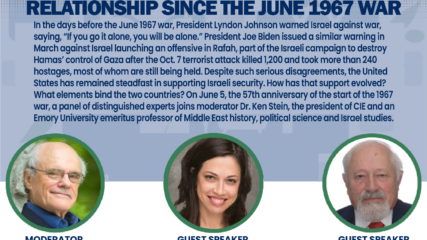
In the days before the June 1967 war, President Lyndon Johnson warned Israel against war, saying, “If you go it alone, you will be alone.” President Joe Biden issued a similar warning in March against…

Since Hamas and allies invaded Israel, killed 1,200 Israelis and others, and seized more than 240 hostages Oct. 7, Israel has conducted a methodical military campaign in Gaza that has uncovered hundreds of miles of…
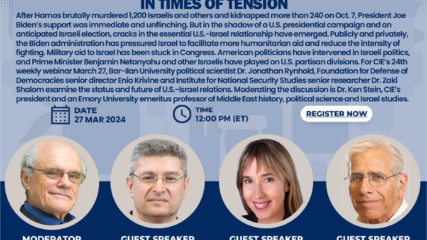
After Hamas brutally murdered 1,200 Israelis and others and kidnapped more than 240 on Oct. 7, President Joe Biden’s support was immediate and unflinching. But in the shadow of a U.S. presidential campaign and an…

The 11th webinar in the Center for Israel Education’s weekly series on the Israel-Hamas war is a special one-on-one conversation between CIE President Ken Stein and David Harris, the former longtime CEO of the American…
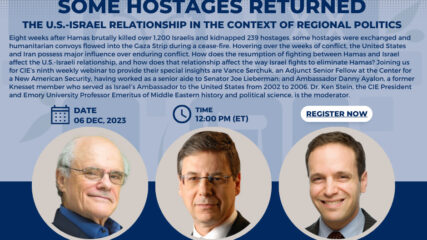
Eight weeks after Hamas brutally killed over 1,200 Israelis and kidnapped 239 hostages, some hostages were exchanged and humanitarian convoys flowed into the Gaza Strip during a cease-fire. Hovering over the weeks of conflict, the…
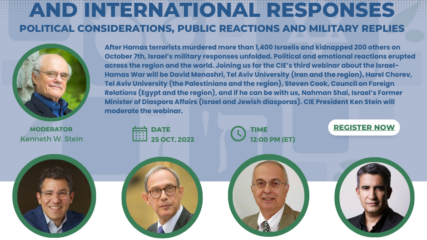
October 25, 2023 After Hamas terrorists murdered more than 1,200 Israelis and others and kidnapped at least 240 on Oct. 7, 2023, Israel’s military responses unfolded. Political and emotional reactions erupted across the region and…

The murderous attacks perpetrated by Hamas terrorists against Israelis reverberated across Israel, the region and the world. As Israel buried tens of hundreds of its dead, the government formed an emergency war cabinet to shape responses as thousands were mobilized for reserve duty. On Israel’s borders and across the region, tensions rose. The U.S. responded with unequivocal presidential, congressional and military support for Israel’s national security and President Biden’s visit to Israel on October 18. Joining CIE to provide insight into Hamas’ ideological motivations, its connections to Iran and the rise of Islamic antisemitism were Tel Aviv University Professor Meir Litvak. Discussing Middle Eastern, North African and international responses was Dr. Sarah Feuer, a lecturer at Reichman University and a research fellow at the Gazit Institute in Tel Aviv. Addressing the implications and context of Biden’s visit was Dr. Amnon Cavari, who teaches at Reichman University and this year is an Israel Institute visiting professor of political science at the University of Michigan. During this 39-minute webinar, they talked about Hamas’ genocidal ideology and its reasons for striking now, the likelihood of weakening regional and international support for Israel as the war continues, and the war’s best possible outcomes for Israel. Moderating was Dr. Ken Stein, the Center for Israel Education’s president and an Emory University professor emeritus of Middle Eastern history and political science.

More than 1,000 Hamas fighters launched a coordinated attack into Israel on October 7, killing more Israeli Jews in 24 hours than died in the June 1967 Six-Day War (774) or on any single day since the Holocaust. Providing context and analyzing possible results for this fifth Hamas-Israeli military clash were Professor Yaron Ayalon, head of the Jewish studies program at the College of Charleston; Professor Jonathan Rynhold, head of the political studies department at Bar-Ilan University; and Ken Stein, Emory Professor Emeritus of Middle Eastern History and Political Science and President of the Center for Israel Education. In 52 minutes they provided analyses for Hamas’ goal of destroying Israel, Israel’s pending responses to the mass killings, and Iran’s influence on Hamas. They evaluated America’s response and the vast political gulf expanded between Israelis and the Palestinians, preventing any political accommodation between them well into the future.
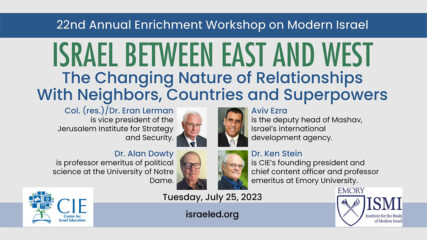
How has Israel through its 75 years managed its relationships with superpowers, neighbors and other countries while trying to survive and thrive in an often hostile neighborhood? Why is the U.S. relationship essential? What is…
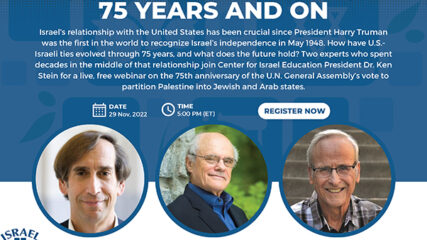
Join CIE’s founding president, Ken Stein, in a conversation at 5 p.m. ET on Nov. 29 with two experts in the field of U.S.-Israel relations, Aaron David Miller and Raphael Danziger, as part of CIE’s Israel@75: A Yearlong Exploration program.

Live and recorded online discussions lasting less than an hour go in depth into specific aspects of the State of Israel, from its international relations to its domestic culture.
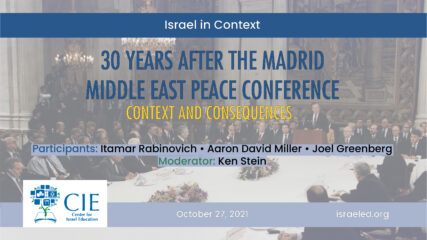
This 54-minute webinar, recorded Oct. 27, 2021, is part of the Center for Israel Education’s “Israel in Context” series and is incorporated into an extensive set of documents, study guides, videos and other resources CIE has compiled at https://israeled.org/madrid-conference/ to mark the 30th anniversary of the Madrid Middle East Peace Conference, when Israel first sat at the same table with all of its immediate Arab neighbors to talk peace.

President Biden comes to the presidency with more Washington experience than any other former president. While he has designated a foreign policy team with significant experience, his immediate priorities will be domestic. With a razor thin senate majority why would he expend political capital in trying to find solutions to Middle Eastern issues that are highly complex, seemingly intractable, and culturally embedded? The exception might be seeking to curtail Iran’s nuclear and regional aggressiveness.

CIE Founding President, Professor Ken Stein and Visiting Israeli Scholar, Dr. Nachman Shai, who served in the Israeli Parliament for 10 years, explain the context and implications of the Abraham Accords for Israel and the Middle East.

A four-person panel of journalists and scholars focuses on multiple aspects of the 2020 U.S. presidential and congressional elections in this 75-minute video recorded Sept. 3, 2020.
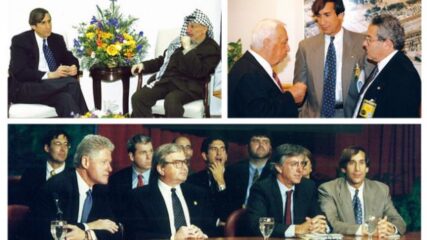
March 3, 2020 Aaron David Miller analyzes the evolving role of the United States in Middle Eastern and Israeli politics and diplomatic processes. Miller currently serves as vice president for new initiatives and a distinguished research…

The analysis summarizes the declaratory or aspirational Trump Plan for a Palestinian-Israeli settlement, outlining proposals on final status issues, and the proposed economic development package, with a hope for a two state-solution. Maps are used to show how Palestine’s and Israel’s borders have changed over the last 150 years. (Video or audio)
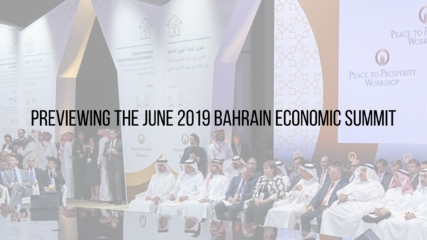
CIE President Ken Stein speaks with David Makovsky, the Ziegler distinguished fellow at the Washington Institute for Near East Policy on June 19, 2019. The major focus of the discussion was on the upcoming US led Peace to Prosperity workshop which was held in Bahrain June 25 and 26, 2019 at which Makovsky was an observer. Stein and Makovsky discuss, in-depth, the economic summit, the Trump administration’s Middle East Peace Plan, and the prospects for success.
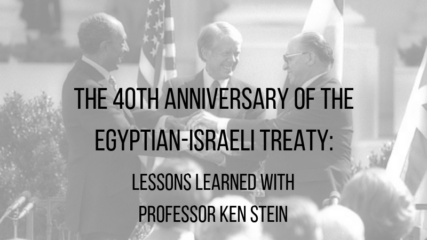
March 26, 2019 From 1967 forward, Arab-Israeli negotiations began in earnest. First under the Nixon and Ford administrations, then under the Carter administration, Egyptian President Anwar Sadat and Israeli prime ministers implemented the political trade-offs…
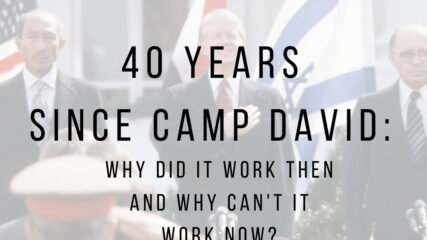
Emory Professor of Contemporary and Middle Eastern History, Political Science, and Israeli Studies and Center for Israel Education President Kenneth W. Stein applies decades of document-based research, interviews and scholarship, including new insights gleaned from the study of detailed minutes in the Israel State Archives, to examine the Camp David Accords 40 years after Egypt’s Anwar Sadat and Israel’s Menachem Begin signed the agreement Sept. 17, 1978, that concluded 13 days of negotiations led by President Jimmy Carter.
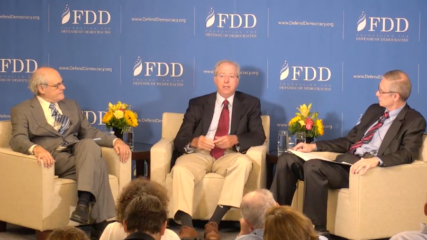
On August 15, 2016, I had the pleasure of participating in a panel discussion with former Ambassador Dennis Ross for the Foundation of Defense of Democracies (FDD) in Washington, DC.
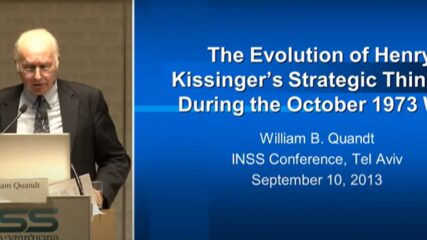
September 10, 2013 Speaker: Professor William Quandt, Professor Emeritus, University of Virginia, speaks at the “Yom Kippur War — A Launching Pad for U.S. Middle East Policy” conference, held in Tel Aviv by the Institute…